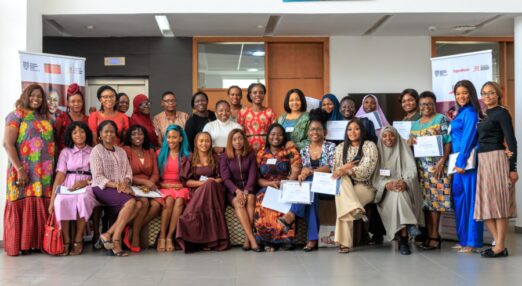Bridging the Divide: Women, Tech and Business Success
Exploring the experiences of women entrepreneurs in low and middle income countries in 2023

Released for International Women’s Day 2024, our latest report “Bridging the Divide: Women, Technology and Business Success”, in partnership with Intuit, highlights the key issues facing women entrepreneurs and outlines our calls to action for tackling them. The comprehensive report draws on responses from over 1,100 women across 81 countries.
Identifying women’s common challenges and opportunities, the report casts a particular spotlight on the broader influence and potential of technology, such as AI, for women’s businesses, and resulting gendered social and economic outcomes.
Key findings
Women entrepreneurs have a significant and growing reliance on digital but face barriers
Over nine out of 10 (92.8%) of respondents report high internet usage, predominantly on smartphones (92.1%). We find a $30 billion USD market for business digital tools in business for women entrepreneurs in low and middle income countries, with 54.1% of respondents expressed the intention to spend more on these in the previous year, projecting 37.2% growth in 2024. Yet, costs and network disruptions are significant barriers to internet access for 69.1% and 67.3% respectively. This is particularly concerning given a quarter (24.4%) of women highlighted increased digital inclusion as a key factor in business success.
Generative AI usage is growing but requires support
44.4% of respondents have already adopted AI tools. Content generation or editing emerges as by far the most prominent use, with 46.9% of respondents who already use AI doing so for this purpose. The primary barrier to AI adoption is the need for more training, as cited by 65.5% of respondents.
Women entrepreneurs' use of AI tools (%)
Networks are critical – including online
A third (32.8%) of respondents attributed success to improved access to business networks, both virtual and in-person.
Online gender-based violence is very common and affects women’s businesses
Two thirds (67.4%) of respondents reported personally witnessing or experiencing online GBV in the last year. Nearly half (45.4%) of respondents reported that experiences of online GBV has some impact on their business, with 9.3% stating these incidents had significantly or drastically impacted their business.
I run a clothing line business. Oftentimes I'm faced with gender-based harassment on social media, including online stalking, unsolicited explicit messages, and derogatory comments, highlighting the persistence of gender discrimination in online spaces.
Gender discrimination in business remains rife
Over a quarter (28.5%) of respondents reported facing gender discrimination during just the previous one year. Incidents reported include scepticism about women’s capabilities and struggles in male-dominated sectors.
Accessing finance is a huge issue
The biggest challenge for women in 2023 by far was access to finance (25.6% of respondents). The second most significant challenges were the macroeconomic environment (13.3%) and retaining customers (11.4%).
Women's top business challenges in 2023 (%)
The survey asked women entrepreneurs to assess their key successes and challenges, as well as ways to address challenges. To do so, there is significant demand from women for financial support (requested by 80.4% of respondents), followed by access to entrepreneurs’ networks and associations (52.1%), financial investment (47.7%), skills or training (46.0%), and mentorship or coaching (47.6%).
Recommendations for change
We call upon the public, private and third sectors to take urgent action now to support women entrepreneurs:
- Design and implement gender-specific, woman-centred programmes to support women entrepreneurs’ use of digital tools and technologies, including AI-enabled tools and all with gender-neutral algorithms. Reducing the gender gap in access to and use of these vital tools requires targeted training and access initiatives to build women’s skills and confidence in the digital sphere. Training should also include soft skills, technical skills, and how to navigate local business regulatory environments.
- Call out and combat harmful gender stereotypes and gender based discrimination that impact on women entrepreneurs’ ability to start, sustain and grow their businesses. All stakeholders have a role to play in raising awareness of the impacts of harmful stereotypes on women’s ability to realise their rights, abilities and opportunities. Regulatory, civil and private sectors—particularly the technology industry, which is designing and managing online tools—should ensure and monitor women’s ability to access online business spaces safely.
- Bolster private businesses’ awareness of, and ability to meet, women entrepreneurs’ growing need and propensity to spend on technology-enabled business services. The average monthly spending on these tools indicates that serving women entrepreneurs’ needs is already a multi-billion-dollar industry; women are planning to expand this spending by an average of 37.2% during 2024. Working through business associations in low and middle income countries, global service providers should be educated on local needs. This could lead to more gender-specific and tailored product designs and pricing, such as mobile-first technologies to ease access to digital business tools.
Upgrading the devices is very costly and so is trying to set up a technologically linked office.
- Design and deliver gender-specific women-centred programmes to increase the adoption of digital financial services among women entrepreneurs. Investments from private financial institutions, the fintech industry and the public sector can help overcome the gap between the relatively high degree of online banking usage and relatively low uptake of digital payment systems among this cohort of women entrepreneurs. These new services could be used to meet the investment needs of small businesses, with specific product offerings for women-owned businesses.
- Offer new avenues for women entrepreneurs to expand and solidify business networks across various sectors, geographies and business tool applications. This was a major driver of success for women during 2023. Fresh investments to create new or grow access to existing women entrepreneurs’ networks, associations, or other forms of interest groups could further bolster their ability to enhance their businesses with professional and personal support, access to customers and markets, and sharing of opportunities.
- Make significant investments in bolstering the physical public infrastructure necessary for improved coverage, reliability and speed of broadband services. This is particularly true for remote areas in low and middle income countries, but could also apply to cities, towns and villages, where service standards are suboptimal.
“As we unveil the findings of our latest research, it’s evident that the path to economic empowerment for women entrepreneurs in low and middle income countries is paved with both challenges and opportunities. Digital tools like AI will play a key role in unlocking these opportunities. Now more than ever, it’s imperative for companies and governments alike to heed the call to action. Let’s not only bridge the digital divide but also shatter the barriers that hinder women’s access to finance, networks, and opportunities. Together, we can empower women to thrive in the digital age.”
– Dhivya O’Connor, CEO, Cherie Blair Foundation for Women.
“We are delighted to partner with the Cherie Blair Foundation for Women on this groundbreaking research. Empowering women entrepreneurs with access to technology unlocks the full potential of women to drive economic growth and innovation. At Intuit, we recognize the important need for companies to partner with others and work to address the unique challenges women business owners encounter. By championing inclusion, providing tangible solutions and increasing confidence, we can create a future where every entrepreneur has an opportunity to thrive.”
– Humera Shahid, Chief Diversity, Equity, and Inclusion Officer and VP of Learning and Development, Intuit
In partnership with

You or your company can help bridge the divide
-

Become a mentor
Become a mentor and be part of a woman entrepreneur’s business success story.
Read more
-

Corporate and Institutional Partnerships
Purpose-designed collaborations that advance women's entrepreneurship.
Read more
-

Become a mentee referral partner
Collaborate with us to support women entrepreneurs in your networks through the power of mentoring.
Read more
